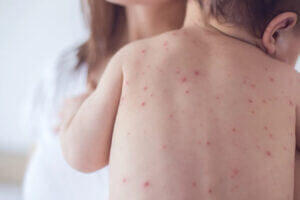 Chickenpox is a highly infectious disease that usually occurs during childhood. By adulthood, more than 90% of Americans have had chickenpox. Since the mid-1990s, most children have been vaccinated against the infection. The disease is caused by the varicella-zoster virus (VZV), a form of the herpes virus. In 2022, 267 varicella cases were reported. The annual number of reported varicella cases increased from 2017 to 2019 and decreased significantly in 2020 and 2021. In July, the varicella rate was highest among infants <1 year old at 1.7 cases per 100,000 population, which is consistent with previous months. Chickenpox used to be common in the US, causing many hospitalizations and even deaths. Since the vaccine was introduced in 1995, it has prevented millions of infections every year. It prevents severe illness in almost all kids who are vaccinated. It’s also very effective in preventing mild illness. Vaccinated kids who do get chickenpox generally have a mild case.
Chickenpox is a highly infectious disease that usually occurs during childhood. By adulthood, more than 90% of Americans have had chickenpox. Since the mid-1990s, most children have been vaccinated against the infection. The disease is caused by the varicella-zoster virus (VZV), a form of the herpes virus. In 2022, 267 varicella cases were reported. The annual number of reported varicella cases increased from 2017 to 2019 and decreased significantly in 2020 and 2021. In July, the varicella rate was highest among infants <1 year old at 1.7 cases per 100,000 population, which is consistent with previous months. Chickenpox used to be common in the US, causing many hospitalizations and even deaths. Since the vaccine was introduced in 1995, it has prevented millions of infections every year. It prevents severe illness in almost all kids who are vaccinated. It’s also very effective in preventing mild illness. Vaccinated kids who do get chickenpox generally have a mild case.
What Are The First Symptoms Of Chickenpox?
Since chickenpox (also called varicella) does still exist, both in the United States and all over the world you should know about the symptoms if you have young children. Usually, the child will complain about a sore throat, have a fever, headache, body aches, and an upset stomach. The rash usually will then appear a couple days later. The rash is very irritating. It is itchy and has fluid filled blisters that usually crust over in 4 to 5 days. Oatmeal baths can be soothing and itch-relieving for chickenpox. Taking a bath won’t spread chickenpox from one area of your skin to another.
Treatment For Chickenpox
The most important thing is not to scratch open the blisters. This can lead to infection and make the symptoms much worse.
Some of the home remedies that can ease the discomfort and itching are:
- Drinking water to stay hydrated
- Apply calamine lotion
- Soak in a bath of baking soda for 20 or 30 minutes to reduce inflammation and pain
- Use cold compresses on the rash
Reasons To Talk With Your Pediatrician
You will not have to take your child to see the pediatrician if you know your child has chickenpox. The only thing you can do is try and make your child comfortable. Ask your doctor about giving them over the counter antihistamine and Tylenol.
When is it necessary to call the doctor?
- Your child has a very high fever. If you have an infant younger than 3 months old with a rectal temperature of 100.4°F (38°C) or higher or an older child with a temperature of higher than 102.2°F (39°C).
- If there are signs of infection of the blisters — they will get larger and more painful.
- If your newborn is showing signs of chickenpox
- Your child’s fever goes away and then comes back
Is There A Prevention For Chickenpox?
The best way to prevent chickenpox is to get the chickenpox vaccine. Everyone—including children, adolescents, and adults—should get two doses of the chickenpox vaccine if they have never had chickenpox or were never vaccinated. The chickenpox vaccine is very safe and effective at preventing the disease. The first vaccine is given when your baby is 12 to 15 months old, and a second vaccine is given at 4 to 6 years old. Allowing children to be exposed to the full-strength Varicella Zoster Virus creates a much greater risk of serious side effects and complications than the mild dose received in a vaccination. In addition to vaccination, you can help prevent the spread of chickenpox by practicing good hygiene and washing your hands frequently. Reduce your exposure to people who have chickenpox.
If your child has chickenpox, stay at home until all of your blisters have dried and crusted over.
Contact Us (859-525-8181) if you have any questions!
—
 About Pediatrics of Florence
About Pediatrics of Florence
We believe that children are more than just “little adults.” They have unique personalities, challenges, and life circumstances and we have made every effort to make our offices and care as “kid friendly” as possible. We have an aquatic theme in the waiting rooms (separated for sick and well children) as well as themed examination rooms. All of our physicians are Board Certified Pediatricians and members of the American Academy of Pediatrics and our nurse practitioners are all licensed Pediatric Nurse Practitioners and are available to see both well and sick children.
> Learn More About Pediatrics of Florence
